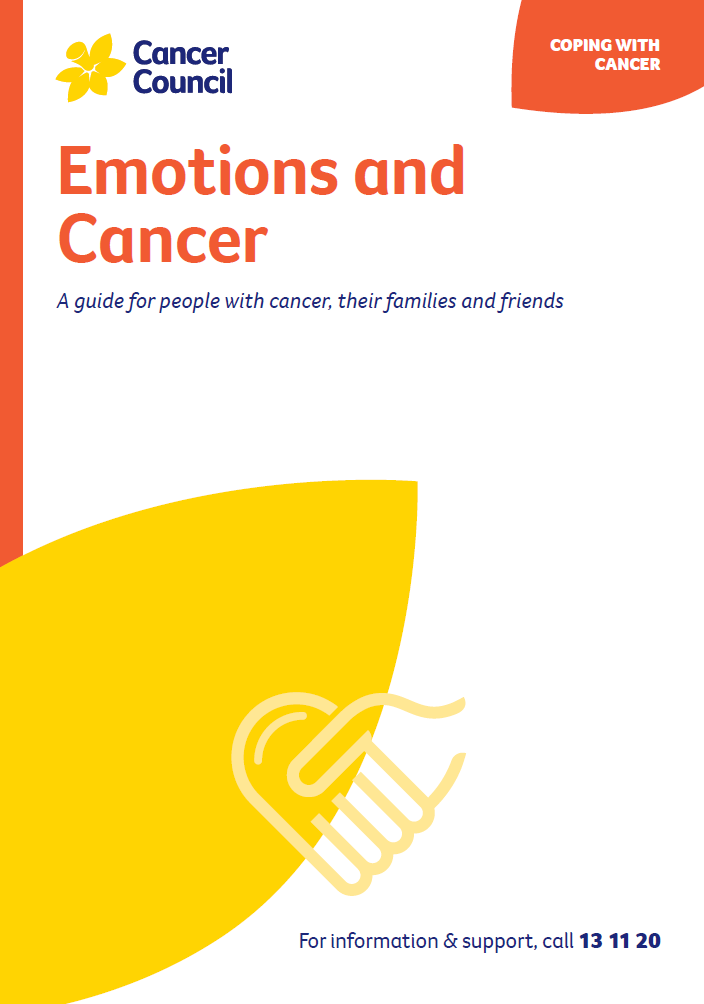- Home
- About Cancer
- Coping with a diagnosis
- Emotions and cancer
- Your coping toolbox
- Tools for coping
Tools for coping
A coping toolbox is a set of strategies or “tools” you can use to help you cope with a cancer diagnosis and treatment. Each person’s toolbox will look different, but it’s useful to consider a range of strategies.
Some of the tips below offer ways to solve particular problems; others aim to enhance your general wellbeing during this stressful time.
If you’d like support with developing your coping toolbox, call 13 11 20.
Find out what to expectGetting information about cancer and how it is treated can help you make decisions, plan ahead and feel more secure. Read more about gathering information. |
|
Be activeResearch has shown that regular physical activity can help with feelings of anger, stress, anxiety and depression. It can also help boost your energy levels and improve sleep. Even a short daily walk can be effective. Read more about exercise for people living with cancer. |
|
Seek supportShare your concerns with a family member or friend, or with your general practitioner (GP), nurse, social worker or psychologist. You could also call Cancer Council 13 11 20, visit the Online Community, or join a support group. Accepting help with housework and other chores may also make it easier to cope. Find more sources of support. |
|
 |
Eat and drink wellEating healthy food and drinking plenty of water will help your body cope with physical and emotional stress. This can be challenging when you are feeling unwell. Talk to a dietitian and see Nutrition and cancer for tips. |
Take a breakMake time each day just for relaxation and enjoyment. Think about things that help you to relax and feel good, such as reading, listening to music, taking a bath or having a massage. Keeping in touch with the world through work, hobbies, or time with family and friends may help you connect with your life outside of cancer and provide a break from your worries. |
|
Sort out issuesA cancer diagnosis can cause or add to financial problems, work-related issues, accommodation difficulties, relationship concerns and family stresses. There is support available – talk to the hospital social worker or call Cancer Council 13 11 20. |
|
Clear your mindComplementary therapies, such as relaxation, massage, yoga and counselling, may increase your sense of control, decrease stress and anxiety, and improve mood. |
|
Draw on spiritualitySome people find meaning and comfort in their faith. Others may see spirituality more generally. A cancer diagnosis can challenge deeply held beliefs. It could help to talk with a spiritual care practitioner or religious leader. |
→ READ MORE: Gathering information
Podcast: Coping with a cancer diagnosis
Listen to more of our podcast for people affected by cancer
Watch this video to see why eating well is so important after a cancer diagnosis, and what you can do to maintain a healthy diet.
Research shows that exercise benefits people with cancer during and after treatment. Find out more in this video or see our other exercise videos.
More resources
Dr Michael Murphy, Psychiatrist, NSW Health, and Conjoint Senior Lecturer, UNSW, NSW (clinical review); A/Prof Anne Burke, Co-Director, Psychology and Allied Health Lead, Cancer, Central Adelaide Local Health Network and The University of Adelaide, SA; Hannah Chen, Psychologist, Cancer Council Queensland; Hazel Everett, Clinical Nurse Consultant, Cancer Services, St John of God Subiaco Hospital, WA; Shona Gates, Senior Social Worker, North West Cancer Centre, TAS; Dr Jemma Gilchrist, Senior Clinical Psychologist, Mind My Health and Crown Princess Mary Cancer Centre, Westmead, NSW; Sandra Hodge, Consumer; Dr Michael Murphy (see above); Caitriona Nienaber, 13 11 20 Consultant, Cancer Council WA; Dr Alesha Thai, Medical Oncologist, Peter MacCallum Cancer Centre, VIC; Alan White, Consumer.
View the Cancer Council NSW editorial policy.
View all publications or call 13 11 20 for free printed copies.

